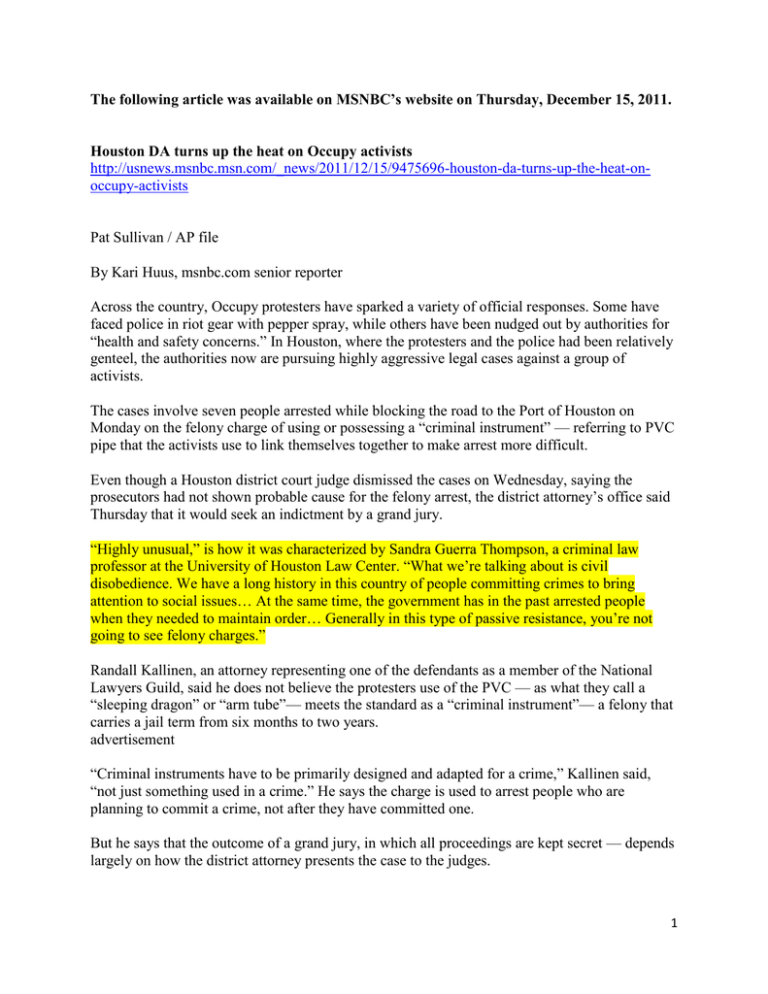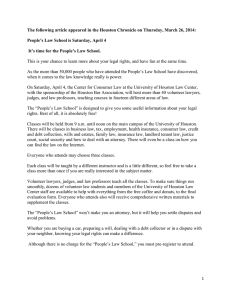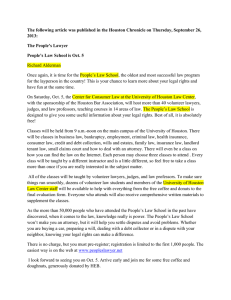The following article was available on MSNBC’s website on Thursday,... Houston DA turns up the heat on Occupy activists
advertisement

The following article was available on MSNBC’s website on Thursday, December 15, 2011. Houston DA turns up the heat on Occupy activists http://usnews.msnbc.msn.com/_news/2011/12/15/9475696-houston-da-turns-up-the-heat-onoccupy-activists Pat Sullivan / AP file By Kari Huus, msnbc.com senior reporter Across the country, Occupy protesters have sparked a variety of official responses. Some have faced police in riot gear with pepper spray, while others have been nudged out by authorities for “health and safety concerns.” In Houston, where the protesters and the police had been relatively genteel, the authorities now are pursuing highly aggressive legal cases against a group of activists. The cases involve seven people arrested while blocking the road to the Port of Houston on Monday on the felony charge of using or possessing a “criminal instrument” — referring to PVC pipe that the activists use to link themselves together to make arrest more difficult. Even though a Houston district court judge dismissed the cases on Wednesday, saying the prosecutors had not shown probable cause for the felony arrest, the district attorney’s office said Thursday that it would seek an indictment by a grand jury. “Highly unusual,” is how it was characterized by Sandra Guerra Thompson, a criminal law professor at the University of Houston Law Center. “What we’re talking about is civil disobedience. We have a long history in this country of people committing crimes to bring attention to social issues… At the same time, the government has in the past arrested people when they needed to maintain order… Generally in this type of passive resistance, you’re not going to see felony charges.” Randall Kallinen, an attorney representing one of the defendants as a member of the National Lawyers Guild, said he does not believe the protesters use of the PVC — as what they call a “sleeping dragon” or “arm tube”— meets the standard as a “criminal instrument”— a felony that carries a jail term from six months to two years. advertisement “Criminal instruments have to be primarily designed and adapted for a crime,” Kallinen said, “not just something used in a crime.” He says the charge is used to arrest people who are planning to commit a crime, not after they have committed one. But he says that the outcome of a grand jury, in which all proceedings are kept secret — depends largely on how the district attorney presents the case to the judges. 1 “There’s a saying,” says Kallinen. “In Texas, you can indict a ham sandwich.” The Harris County District Attorney’s Office did not respond to inquiries about the arrests and charges by the time of publication. However, Assistant District Attorney Colleen Barnett told the Houston Chronicle on Wednesday that the felony charges were appropriate. "In the manner of its use, I believe it was a criminal instrument," Barnett told the Chronicle. "The use of it was in blocking the roadway." Some observers say the grand jury hearing, scheduled for Tuesday, may be more related to politics or economic concerns than to the threat from PVC-wielding protesters. She notes that the Houston protesters — unlike their counterparts in other cities — have not been forced to leave a park where they are camped, and in fact were largely ignored until they blocked the port. “I would say that it’s an election year coming up in 2012, so there may be some politics involved,” said the University of Houston’s Guerra Thompson. “But also Houston is a city where people value work and commerce, so the interference with business is something that is going to be taken very, very seriously.” But the whole thing strikes civil rights lawyer Michael Ratner as simply another flavor of the crackdown against Occupy protests going on around the country. “We’ve seen numerous police tactics that are more exaggerated than they should be — whether it's 700 people getting arrested on a bridge in New York or pepper spray of UC Davis protesters or charging people excessively for criminal conduct,” says Ratner, a member of the National Lawyers Guild who is tracking cases related to the movement around the country. “A neutral judge dismissed this case. That should have been the dead end of it,” he said. “The message it sends to people who are going to engaged in protest is that you will be punished severely.” 2

